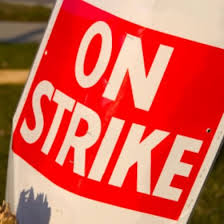

As many feet of snow continue to bury the Northeast, hourly workers are among those most affected. For far too many low-wage hourly workers, closed roads and suspended mass transit mean longer commutes to and from work, resulting in less time on the clock. Workers who are unable to get to their jobs or whose workplaces are closed due to blizzards are often forced to dip into their sick days or vacation time — if they’re fortunate enough to have paid time-off. When schools are closed, workers with children are often faced with either hiring a sitter or taking time off to care for their children, both of which are unaffordable for many.
A study by the American Highway Users Alliance estimated that the delays and closures in late January and halfway into February have cost the city of Boston $265 million per day, two-thirds of which is lost wages for hourly workers. With more snow forecast, low-wage hourly workers will continue to be unfairly penalized through no fault of their own. (wbur.org, Feb. 11)
After workers at Square One child care facilities in Massachusetts were misclassified as temporary employees and denied fair wages, benefits and the protection of their co-workers’ United Auto Workers contract for four years, they took to the courts to resolve the issue. On March 21, 2013, Administrative Law Judge Michael A. Rosas agreed with the workers and ordered Square One management to grant back pay and benefits to the misclassified workers. But the employer filed for an exemption. Two years later, the workers are still waiting for what is rightfully theirs. UAW Local 2322 has circulated a petition demanding that the National Labor Relations Board enforce the judge’s ruling and hold Square One management responsible for its blatant and ongoing violations of the National Labor Relations Act. Sign the petition online at tinyurl.com/UAW2322.
A recently leaked internal memo from Staples management threatens part-time workers with disciplinary action and even termination if they are caught working more than 25 hours a week at the big-box office supply stores. The start of the new hardline policy coincides with the provision of the Affordable Care Act, effective Jan. 1, 2015, which requires employers to offer health care to employees who work at least 30 hours per week — or incur a $3,000 penalty per employee. It seems Staples, which pulled in more than $23 billion in sales in 2013 and employed 46,361 full-time and 36,647 part-time associates as of Feb. 1, 2014, would sooner cut hours and fire workers rather than provide basic health coverage.
One Staples worker, who spoke on condition of anonymity, said, “Before January, it was a smack on the wrist if anyone went over 25 hours — they got an email scolding them, saying, ‘You went over 25, try not to do that.’ But now it’s become really serious.” According to a report released by pollster FiveThirtyEight, several hundred thousand workers are scheduled for fewer hours as employers like Staples try to dodge the health care mandate. (buzzfeed.com, Feb. 9)
Amid a growing movement coast to coast calling for a raise in the federal minimum wage to $15 an hour, researchers Robert Pollin and Jeannette Wicks-Lim of the Political Economy Research Institute examined the real consequences if the fast food industry more than doubled the minimum wage. Their report, released in January, demolishes the age-old argument that higher wages would cause mass layoffs and reduced revenue. According to the report, the industry could easily absorb the cost of a $15 minimum wage. Higher wages would result in higher productivity and lower employee turnover rates, which together would allow restaurants to cover 20 percent of the wage hikes. This, along with modest price increases of 3 percent a year and an already-projected 2.5 percent a year sales growth, would fully cover a $15 minimum wage in the fast food industry. Opponents of raising the minimum wage need to revise their anti-worker scare tactics in light of the study’s findings. (pbs.org, Jan. 28; peri.umass.edu)
As part of Workers World newspaper’s coverage marking the 50th anniversary of the liberation of…
From the PFLP Central Media Office The following statement from the Popular Front for the…
Newark, New Jersey Over 250 people, representing over 250 New Jersey endorsing community groups, attended…
Special to Workers World The following is a press release issued on April 24, 2025,…
dear Larry Krasner, we heard you sued Elon Musk over his corrupt million election giveaways…
Unions join forces against harassment and deportation of members When 200 immigrant workers – from…